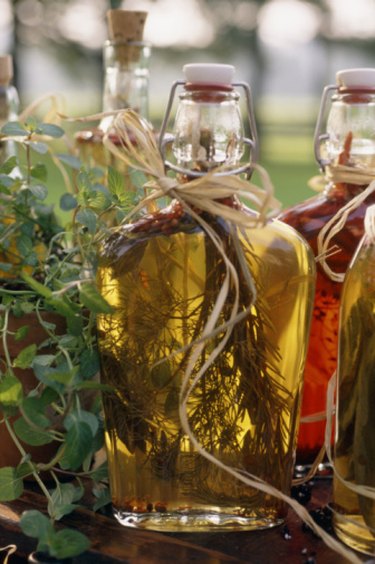
Balsamic and apple cider vinegars have traditionally been used in cooking as well as for their medicinal and health benefits. When made in the traditional way, they contain healthy probiotics. But, while their health benefits continue to be studied, their benefits in the kitchen have been proven beyond a doubt. Although each has a unique flavor, there are several recipes in which both can be used.
Traditional Balsamic Vinegar
Video of the Day
Balsamic vinegar is made from the reduced juice of white grapes. During the aging process, the sugars in the reduced syrup are allowed to ferment into alcohol, which is then converted to acid by bacteria and yeast in the air. True balsamic vinegars have been aged for 12 or more years, but most common balsamic vinegars found in the grocery store have not been made in the traditional ways; these imitation balsamic vinegars are not aged or are made with red wine vinegar, water and sweeteners.
Video of the Day
Traditional Apple Cider Vinegar
Apple cider vinegar is made from the fermented juice of pressed apples. When unfiltered and unpasteurized, it contains an unsightly cloud call the mother, as well as many healthful probiotics. Pasteurized, filtered apple cider vinegar may be more pleasing to the eye, but it lacks the health benefits of less-processed vinegar and loses some of its complex flavor.
Shared Uses in Recipes
Apple cider vinegar and balsamic vinegar can be used to make vinaigrette. Since they are both acidic, they make an excellent addition to marinades used for vegetables, mushrooms or meats. They can be used as an ingredient in basting sauces for grilling meats and fish. They make excellent bases for barbecue sauces, and balsamic vinegar and apple cider vinegar can be used diluted with water as substitutes for cooking wine.
Exclusively Apple Cider Vinegar
Apple cider vinegar makes an excellent base for other seasonings. It can be infused with herbs and spices and left to absorb their flavors. Traditional balsamic vinegar, because of its thick consistency and sweet and sour flavor, is a poor base for this technique.
Exclusively Balsamic Vinegar
Nothing can substitute for traditional balsamic vinegar's rich, deep flavors of the aged grapes combined with the wood used in the fermenting process. Only true balsamic vinegar can be drizzled over ripe fruit, mild cheeses and simply prepared meat and fish. It can even be savored by the teaspoonful for its complex flavor.